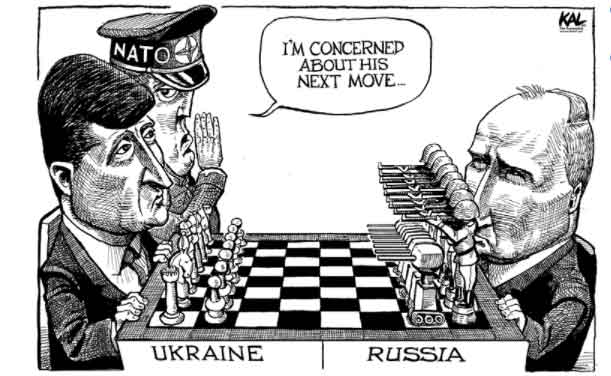
Western countries led by the United States decried the action but did little else about it.
The reason: Under the post-World War II agreements among the nations that had defeated Nazi Germany, Eastern Europe was regarded as a Soviet sphere of influence.
But 21st century Europe differs from 20th century Europe. As a result, when President Vladimir Putin launched his effort to undermine the independence of Ukraine, President Joe Biden was able to orchestrate a broad Western response to Russian aggression.
Indeed, about the only similarity between the current situation and the inaction of 20th century presidents is the caution Biden and NATO are showing in seeking to avoid a direct military confrontation with Russia, lest it spark a Europe-wide nuclear conflict between the globe's most powerful nations.
Underlying the current situation is the fact that, when Eastern European countries broke free from Soviet domination and the Soviet Union itself collapsed in the early 1990s, its successor — Russia -- lost the ability to dominate countries outside its immediate borders.
At the same time, the democracies of Western Europe spread their influence eastward into the resulting void. In the aftermath of the Soviet Union's collapse, they admitted onetime Soviet satellite countries like Hungary, Poland, Slovakia and the Czech Republic and the three former Soviet Baltic republics — Latvia, Estonia and Lithuania -- as members of their key alliances, the military NATO alliance and the economic-oriented European Union.
That very loss of power is, of course, one of the major factors motivating Putin, who has called the collapse of the Soviet Union "the greatest geopolitical catastrophe of the century."
As was the case with his invasions of Georgia in 2008 and Ukraine's province of Crimea in 2014, he seeks to restore at least a semblance of the Soviet empire by reestablishing Russian authority over Ukraine, however he has defined his unjustified decision to unleash the Russian army.
But the one-time Soviet republic, which declared its independence in 1991, has increasingly resisted Russian efforts to restore its primacy, especially over the past decade, and is doing its best to remain independent.
One of Putin's fraudulent excuses for acting is the West's refusal to guarantee that Ukraine won't join Poland, Romania, Slovakia and Hungary, who were once members of the Soviet Union's Warsaw Pact and are now members of NATO.
But though Ukraine's leaders have shown some interest in joining the Western alliance, and former President George W. Bush once sought to make it happen, NATO members have made it clear that membership for Ukraine is not on their agenda for the near future.
For one thing, Ukraine's admission to NATO would require the United States and its allies to come to its support militarily. That is something they are certainly trying to avoid.
But the underlying irony is that, in his zeal to keep the West from bringing Ukraine into NATO, something that was never going to happen, Putin has strengthened the Western alliance's position in other countries on Russia's periphery.
In recent weeks, the United States has moved thousands of troops, eight fighter jets and other warplanes into Poland, Slovakia, Romania and the Baltic countries, placing them far closer to Russia than they would have been before Putin launched the current crisis.
How dangerous to overall European peace the current conflict becomes beyond Ukraine's borders will depend to a substantial degree on how far Putin goes in seeking to subdue that country and whether he launches cyber- or other attacks beyond its borders.
It also will hinge on how far Biden and the United States' European allies go to make good on his vow to make Putin pay "swift and severe" costs for attacking Ukraine — and how far Putin's reaction goes.
Already, however, it is clear the Russian president is confronting a far different and more resistant Europe in the 21st century
than the one his Soviet predecessors faced in the 20th century.
Carl P. Leubsdorf
The Dallas Morning News
(TNS)
Carl P. Leubsdorf is the former Washington bureau chief of the Dallas Morning News.
Previously:
• 02/10/22 Western 'support' also makes Ukraine nervous
• 12/09/21 Dole had respect for his rivals
• 08/18/21 Afghanistan's rapid fall casts cloud over Biden's entire administration
• 07/06/20 Things get complicated quickly for Biden
• 06/17/20: Government gridlock also on the ballot in 2020
• 04/24/20: Congress unprepared if disaster hits it
• 11/18/19: Buttigieg gains steam in Iowa. Why he's still a bad bet
• 03/01/18: How one keystone state congressional race could topple Nancy Pelosi
• 08/31/15: Ineffective Jeb Bush now faces NH challenge from Kasich
• 03/24/14: 7 obstacles Ted Cruz must overcome
• 12/15/14: Hillary sizes up her challenge in 2016


 Contact The Editor
Contact The Editor
 Articles By This Author
Articles By This Author